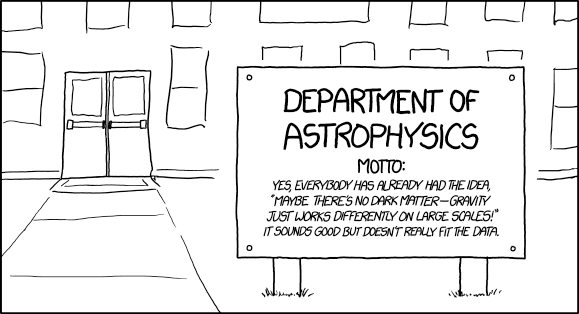Physics and Math Resources
Contents
This is where I will aggregate as many of the resources I’ve found helpful in physics and math topics as I can. I’ll try my best to achieve a sensible separation by subject, though this can be inherently difficult due to very ambiguous boundaries in some cases.
General Audience Resources
Astrophysics
- Brian Koberlein: Five Facts – A series on dark matter, explaining why it fits astrophysical data better than any alternatives. Those parts are:
Technical Resources, Reviews, Lectures
Classical Mechanics
- David Tong: Lectures on Dynamics and Relativity – introduction to Newtonian mechanics and special relativity.
- David Tong: Lectures on Classical Dynamics – on the Lagrangian and Hamiltonian formulations.
- Structure and Interpretation of Classical Mechanics
Statistical Mechanics and Thermodynamics
Quantum Mechanics
A Course in Quantum Computing [PDF] – A wide-ranging and comprehensive introduction to quantum mechanics in the context of quantum computation. It introduces much of the math required (i.e. complex numbers and vector spaces), making it accessible with a minimal amount of prerequisite knowledge. This accessibility, however, is of course correlated with the absence of topics involving infinite-dimensional Hilbert spaces which are some of the most important for physicists.
Quantum algorithm Zoo – A comprehensive catalog of quantum algorithms.
Quantum Field Theory
- David Tong lectures on quantum field theory
- A Simple Introduction to Particle Physics: Part I – An introduction/review for key mathematical and physical concepts in a particle physics, including classical field theory, group theory, gauge theory, etc.
- A Simple Introduction to Particle Physics: Part II – An introduction to geometrical concepts important in particle physics and general relativity, especially differential geometry and algebraic topology.
- Notes from Sidney Coleman’s QFT course
- Two-component spinor techniques and Feynman rules for quantum field theory and supersymmetry
Modern Amplitude Methods
- Scattering Amplitudes – A review of modern amplitude methods including spinor helicity formalism, on-shell recursion relations, superamplitudes and their symmetries, twistors and momentum twistors, loops and integrands, Grassmannians, polytopes, and amplitudes in perturbative supergravity as well as 3d Chern-Simons-matter theories. Multiple examples and exercises are included.
- Gauge and Gravity Amplitude Relations – On simplifications and universalities found in scattering amplitudes for gauge and gravity theories
Solitons & Topological Defects
- David Tong: TASI Lectures on Solitons – On solitons in gauge theories, with emphasis on applications to string theory and supersymmetric gauge dynamics
- Electromagnetic duality for children – Not actually suitable for children, this document reviews general properties of magnetic monopoles in electrodynamics and non-abelian gauge theories, electromagnetic duality, S-duality in supersymmetric gauge theories and its stringy origin.
- Introduction to S-Duality in N=2 Supersymmetric Gauge Theory – A pedagogical review of the work of Seiberg and Witten. Similar to the above.
On \(\mathcal{N}=4\) Super Yang-Mills
- Scattering Amplitudes and the Positive Grassmannian
- The Amplituhedron – This is, in my view, a remarkable reformulation of the maximally supersymmetric gauge theory in terms of a novel structure in higher projective geometry, dubbed the amplituhedron. It is especially noteworthy for rexpressing the problem of computing scattering amplitudes in purely geometric terms without reference to any of the usual physical concepts that are usually needed.
String Theory
- David Tong Lectures on String Theory
- Joe Polchinski: Quantum Gravity at the Planck Length – A pedestrian introduction to string theory, quantum gravity, and experimental hints of a grand unification scale due to coupling constant unification.
- Joe Polchinski: What is String Theory? – A fast-paced and high-level overview of the mathematics of string theory, and some of the best currently available answers to the question in the title.
Plasma
- Plasma Physics – A complete set of lecture notes for a graduate plasma physics course covering particle orbit theory, fluid theory, wave theory, MHD theory, and kinetic theory.
Mathematics
Calculus
- Multivariable Calculus – Text for a two-semester multivariable calculus course.

